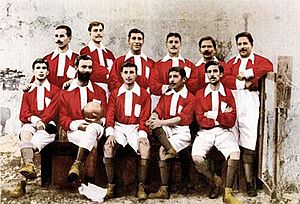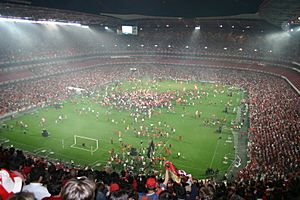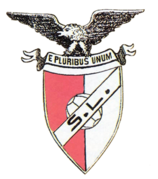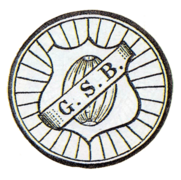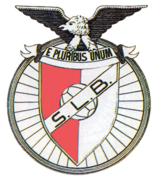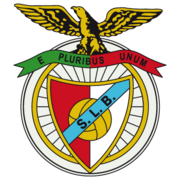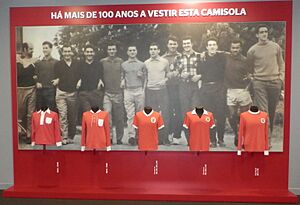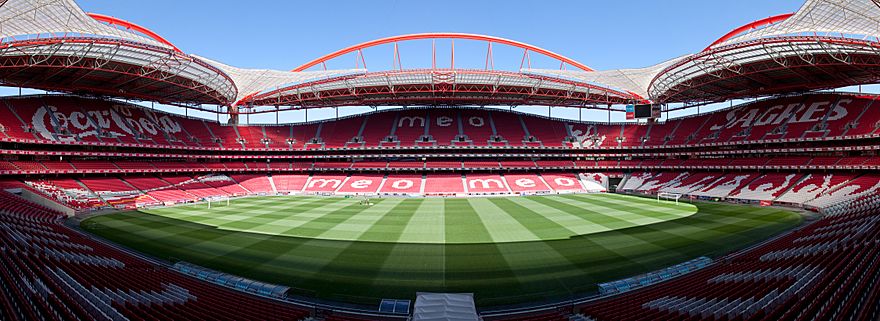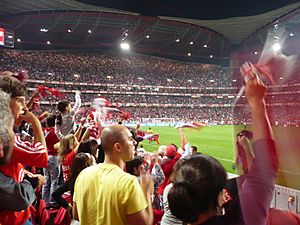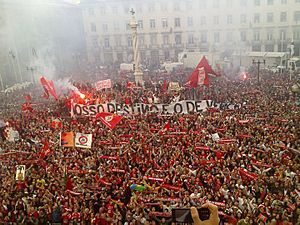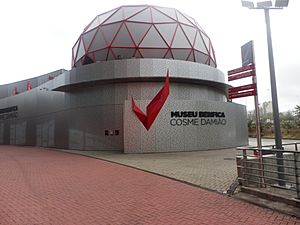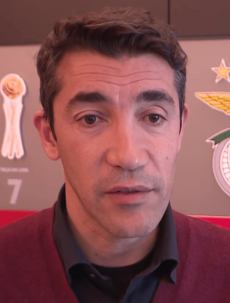S.L. Benfica facts for kids
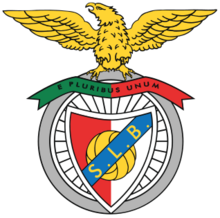 |
||||
| Full name | Sport Lisboa e Benfica | |||
|---|---|---|---|---|
| Nickname(s) | As Águias (The Eagles) Os Encarnados (The Reds) O Glorioso (The Glorious One) Benfiquistas (supporters) |
|||
| Founded | 28 February 1904 (as Sport Lisboa) | |||
| Ground | Estádio da Luz | |||
| Capacity | 68,100 | |||
| President | Rui Costa | |||
| Head coach | Bruno Lage | |||
| League | Primeira Liga | |||
| 2024–25 | Primeira Liga, 2nd of 18 | |||
|
||||
Sport Lisboa e Benfica, usually called Benfica, is a professional football club from Lisbon, Portugal. They play in the Primeira Liga, which is the top football league in Portugal.
Benfica was started on 28 February 1904, as Sport Lisboa. It is one of Portugal's "Big Three" clubs, meaning they have never been moved down from the Primeira Liga. Their main rivals are Sporting CP and FC Porto. Benfica's nicknames are As Águias (The Eagles), because of the eagle on their club badge, and Os Encarnados (The Reds), for their red shirts.
Since 2003, Benfica's home stadium has been the Estádio da Luz. This new stadium replaced their older one, which was built in 1954. Benfica is the most popular club in Portugal, with the highest percentage of fans in its own country. In February 2025, they had 400,000 club members, making them the largest sports club in the world by membership. Their club song is "Ser Benfiquista", and their fans are called benfiquistas. The club's motto is "E pluribus unum" ("Out of many, one"), and their mascot is Águia Vitória, an eagle.
Benfica is one of the two most successful clubs in Portugal, having won 87 major trophies. They have won 84 trophies in Portugal, including a record 38 Primeira Liga titles, 26 Taça de Portugal cups, and 8 Taça da Liga cups. On the international stage, they won the Latin Cup in 1950 and the European Cup twice in a row, in 1961 and 1962. These European Cup wins are special because no other Portuguese club has done this. They also reached the finals of the Intercontinental Cup twice and the European Cup five more times. Benfica has played in ten European finals, which is a record for a Portuguese club.
Benfica was voted 12th in the FIFA Club of the Century list and ranked 9th among European clubs of the 20th century by the IFFHS. In UEFA, Benfica is 8th in the all-time club ranking. They have played in the UEFA Champions League (formerly the European Cup) 42 times, which is the second most by any club. They also have the most wins (130) in this tournament for a Portuguese club. In 1965–66, they set a record for the biggest win over two matches in the European Cup. Benfica also holds the European record for the most consecutive wins in a domestic league (29 wins). They were the first team to win the league without losing a single game in 1972–73.
Contents
Club History: How Benfica Began and Grew
Early Years: Founding and First Steps (1904–1960)
On 28 February 1904, a group of 24 people met in Lisbon to create a football club called Sport Lisboa. They wanted the club to be only for Portuguese players. Cosme Damião, a key figure, was at this meeting. They decided the club's colours would be red and white. The club's badge would feature an eagle, the motto "E pluribus unum", and a football.
Sport Lisboa played their first match on 1 January 1905. However, the club faced challenges, including poor playing fields. In May 1907, eight players left to join Sporting CP, which started the big rivalry between the two clubs.
On 13 September 1908, Sport Lisboa joined with another club, Grupo Sport Benfica. The new club was named Sport Lisboa e Benfica. They kept Sport Lisboa's football team, colours, eagle, and motto. From Grupo Sport Benfica, they kept their field and main leaders. A bicycle wheel was added to the badge to show that cycling was also an important sport for the club.
Benfica moved to different stadiums over the years. In 1925, they moved into their own stadium, the Estádio das Amoreiras. The Portuguese league started in 1934. Benfica won the first three championships in a row (1935–36, 1936–37, 1937–38). In the 1940s, they won three more league titles and four Taça de Portugal cups. In 1943, coach János Biri helped the club win its first "double" (winning both the league and the cup in the same season).
Benfica had its first international success in 1950 when they won the Latin Cup. They were the only Portuguese club to ever win this trophy. In 1954, Benfica became more professional and moved into the original Estádio da Luz. This stadium could hold 40,000 people and was later expanded to 70,000. In the 1950s, Benfica won three more league titles and six Taça de Portugal cups.
Golden Era and Continued Success (1960–2003)
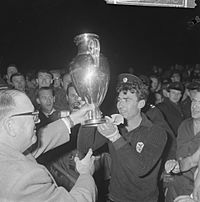
Under coach Béla Guttmann, Benfica became European champions two years in a row. They won the European Cup against Barcelona in 1961 and against Real Madrid in 1962. After these wins, Benfica played in the Intercontinental Cup but lost both times. They reached three more European Cup finals in the 1960s but lost them all.
In the 1960s, Benfica won eight league titles and three Taça de Portugal cups, along with their two European Cups. Many of these wins were thanks to amazing players like Eusébio, Coluna, and José Águas. Eusébio is the only player from a Portuguese club to win the Ballon d'Or, an award for the best football player in Europe.
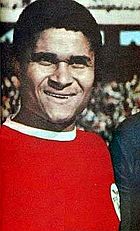
Benfica continued to be very strong in Portuguese football during the 1970s, winning six league titles and two Taça de Portugal cups. In 1971–72, they reached the semi-finals of the European Cup. The next season, 1972–73, Benfica made history by winning the league without losing a single game. They won 28 out of 30 matches and scored 101 goals. Eusébio was again Europe's top scorer that season.
In the 1980s, Benfica kept winning many trophies in Portugal. In 1980–81, they became the first club to win all Portuguese trophies in one season: the Supertaça, the league, and the Taça de Portugal. Under coach Sven-Göran Eriksson, they won two league titles in a row and reached the final of the UEFA Cup in 1983. In 1985, the Estádio da Luz was expanded, becoming the largest stadium in Europe at the time. Benfica also reached two more European Cup finals in 1988 and 1990 but lost both.
However, the club started facing financial problems in the 1990s. This led to many changes in coaches and a period with fewer trophies. From 1994 to 2003, Benfica had eleven different coaches. They also had their lowest league finish ever, coming in sixth place in 2000–01, and missed out on European competitions for a couple of seasons. In 2000, club members decided to build a new Estádio da Luz.
Modern Era: New Stadium and More Trophies (2003–Present)
In 2003–04, Benfica ended their long wait for a trophy by winning the Taça de Portugal. The next year, they won their first league title since 1994. In 2009, Benfica won their first Taça da Liga cup, meaning they had now won all major Portuguese competitions. They also reached the quarter-finals of the UEFA Champions League in 2005–06.
From 2009–10 to 2015, with coach Jorge Jesus, Benfica won 10 domestic trophies. This included a special "treble" in 2013–14, where they won the league, the cup, and the league cup all in one season. They also won the league two years in a row for the first time since 1984. Benfica also reached two Europa League finals in a row in 2013 and 2014.
Later, under coach Rui Vitória, Benfica won their fourth league title in a row in 2017, which is called a tetra. They also won another Taça de Portugal and two Super Cup trophies.
In 2018–19, coach Bruno Lage led Benfica to their 37th league title. In 2019–20, they won the Super Cup. From 2021–22 to 2022–23, with Rui Costa as president, Benfica won their 38th league title and reached the Champions League quarter-finals for the second time in a row. In 2023, they won the Super Cup again, and in 2025, they won the league cup and played in the FIFA Club World Cup for the first time.
Club Badge and Team Kit
Benfica's club badge has an eagle, which stands for independence and strength. The shield on the badge is red and white, showing bravery and peace. The club's motto, "E pluribus unum" ("Out of many, one"), means that all members are united. The letters "SLB" (Sport Lisboa e Benfica) are on top of a football. All of this is placed on a bicycle wheel, which reminds everyone that cycling was one of the club's first sports.
Benfica has had four main badges since 1904. The current badge comes from the 1908 merger. The eagle's position and the wheel's size were changed in 1930 and 1999.
Since the 2008–09 season, Benfica's football shirts have three stars above the badge. Each star means the club has won ten league titles.
In 1904, José da Cruz Viegas chose Benfica's kit. Red and white were picked because they were easy for players to see. The club chose red shirts with white collars, pockets, and cuffs, along with white shorts and black socks. Benfica's white away kit was first used in 1944–45.
Benfica has always worn red shirts. Because of this, fans used to call them Vermelhos (Reds). But in 1936, during the Spanish Civil War, the Portuguese government censored the word "vermelhos" because it was also used for communists in Spain. So, Benfica became known as Encarnados, which means "reds" but with a different meaning.
Home Stadiums
For many years, Benfica played in rented stadiums. Their first stadium that they owned was the Estádio das Amoreiras, built in 1925. They played there until 1940.
From 1954 to 2003, Benfica played at the old Estádio da Luz in Lisbon. This stadium was once the largest in Europe and the third largest in the world, holding 120,000 people from 1985 to 1987. It was taken down between 2002 and 2003 to make way for the new stadium.
The new Estádio da Luz was finished in 2003. It is officially called Estádio do Sport Lisboa e Benfica. It is a UEFA category four stadium, which means it's a top-level stadium. It hosted several matches for UEFA Euro 2004, including the final. It also hosted the UEFA Champions League finals in 2014 and 2020. The stadium was built with 65,647 seats and now has 68,100 seats.
Training Ground
Benfica's training ground and youth academy, called Benfica Campus, is in Seixal, near Lisbon. It was built in 2005 and opened on 22 September 2006. This is where the players train and young talents learn to play football.
Benfica Supporters
Benfica fans are known as benfiquistas. They sing the club's song, "Ser Benfiquista", at the start of every home game. They often call the club O Glorioso (The Glorious One), and you can hear them chant "Glorioso SLB".
Since 1952, Benfica has had fan clubs around the world called Casas do Benfica (Benfica houses). These are places where fans can meet and enjoy cultural, social, and sports activities together. When Benfica wins league titles, fans celebrate with the team at the Marquis of Pombal Square in Lisbon.
Benfica is the most popular club in Portugal. A study in 2006 estimated that Benfica had about 14 million supporters worldwide. This included over 5.5 million in Europe (with 4.7 million in Portugal) and over 6 million in Mozambique and Angola. A 2012 study for UEFA found that Benfica has the highest percentage of football supporters in its own country (47%).
In the 2022–23 season, Benfica had an average of 57,108 fans at their home league games. This was the highest average attendance in the Portuguese league and a record for the Estádio da Luz.
Club Members
Benfica's members, called sócios, help choose the club president every four years. They can also vote in meetings, suggest ideas, and be chosen for roles at the club.
In 2003, the club started using electronic voting. In March 2025, new rules were approved by 91% of the members who voted. As of February 2025, Benfica had 400,000 members, making it the largest sports club in the world by membership again.
Club Rivalries
Benfica has big rivalries with Sporting CP and FC Porto. These three clubs are known as the "Big Three" because they are the most successful in Portugal. None of them have ever been moved down from the Portuguese league since it started in 1934.
Since both Benfica and Sporting CP are from Lisbon, their matches are called the dérbi de Lisboa ("Lisbon derby"). This rivalry began in 1907 when some key Benfica players moved to Sporting. It's the most important football derby in Portugal and is followed by fans around the world.
The rivalry between Benfica and FC Porto started with a friendly match in 1912. These two clubs are from Portugal's two largest cities, Lisbon and Porto. They are the two most successful clubs in Portuguese football. Matches between them are called O Clássico (The Classic).
Benfica in the Media
In 2008, Benfica started its own sports TV channel called Benfica TV (BTV). It was the first channel created by a Portuguese club. BTV shows Benfica's home matches in the Primeira Liga, as well as games from their reserve and youth teams. In January 2020, Benfica also launched Benfica Play (BPlay), an online service with special content like interviews and behind-the-scenes videos.
The club also publishes a weekly newspaper called O Benfica every Friday since 1942. It shares news and articles about everything happening at the club.
Benfica Museum
The Museu Benfica – Cosme Damião is located near the stadium. It opened on 29 July 2013. The museum is named after Cosme Damião, one of the club's founders. It was named the Best Portuguese Museum in 2014.
Club Finances and Ownership
In 2000, Benfica created a company called Sport Lisboa e Benfica – Futebol, SAD to manage the professional football team. This company helps with things like playing in competitions, developing players, and managing TV rights.
Benfica SAD started trading on the stock market in 2007. By June 2017, Benfica had earned €617 million from selling players since the 2010–11 season, which was more than any other club in the world. In September 2018, Benfica SAD reported a profit of €20.6 million. In May 2019, Benfica was ranked as the 40th most valuable football brand.
As of September 2021, Benfica owned most of the SAD's shares (63.65%).
Players
Current First-Team Squad
|
|
Other Players Under Contract
|
|
Players Out on Loan
|
|
Retired Jersey Numbers
| No. | Player | Position | Benfica debut | Last match |
|---|---|---|---|---|
| 29 | FW | 24 August 2002 | 25 January 2004 |
On 27 January 2004, Benfica stopped using jersey number 29 to honour Miklós Fehér, who sadly passed away while playing for the team two days earlier.
Club Staff
Coaching Team
| Position | Name |
|---|---|
| Head coach | Bruno Lage |
| Assistant coaches | Luís Nascimento Carlos Cachada Ricardo Rocha |
| Personal trainer | Alexandre Silva |
| Goalkeeping coach | Nuno Santos |
| Analyst coaches | Jhony Conceição Diogo Camacho |
Source:
Club Management
| Position | Name |
|---|---|
| President | Rui Costa |
| Vice-presidents | Domingos Almeida Lima Fernando Tavares Sílvio Cervan Manuel Brito Rui do Passo José Gandarez |
| General assembly president | José Pereira da Costa |
| Supervisory board president | Fernando Fonseca Santos |
Source:
Records and Statistics
Player Records
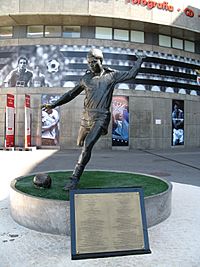
Nené has played the most official matches for Benfica (575 games). Eusébio is the club's all-time top goal scorer, with 473 goals in 440 matches. He also scored the most goals for Benfica in UEFA club competitions, with 56 goals. Luisão has won the most trophies (20) as a Benfica player.
Cosme Damião was the coach who stayed the longest (18 years in a row). Otto Glória won the most league titles (4) and the most trophies (9) before the league cup existed. Jorge Jesus has won the most trophies overall as a coach (10).
Team Records
Benfica is the only team in Portuguese league history to complete two seasons without losing a single game (1972–73 and 1977–78). In the 1972–73 season, they were undefeated champions, setting records for most points (58 in 30 matches) and the biggest difference in points between the champions and the second-place team (18 points). In the 2015–16 season, Benfica earned 88 points in 34 matches, which is the club's highest points total since the league has 18 teams.
Benfica also holds European records for the most consecutive wins in a domestic league (29 wins) between 1971–72 and 1972–73. They also have one of the longest unbeaten runs in all competitions, with 48 matches without a loss from December 1963 to February 1965.
In the 1965–66 European Cup, Benfica scored 18 goals against Stade Dudelange. This was their biggest win over two matches in the European Cup and their largest win in UEFA competitions. Benfica was the first club to reach two UEFA Europa League finals in a row (2013 and 2014). As of the 2022–23 season, Benfica has played in the UEFA Champions League 42 times and the UEFA Europa League 21 times.
Recent Seasons Overview
Here's how Benfica has performed in the last ten completed seasons:
| Season | Pos | Pld | W | D | L | GF | GA | Pts | Top league scorer | Goals | Top overall scorer | Goals | TP | TL | ST | UCL | UEL | Rnk | References |
|---|---|---|---|---|---|---|---|---|---|---|---|---|---|---|---|---|---|---|---|
| 2015–16 | 1st | 34 | 29 | 1 | 4 | 88 | 22 | 88 | Jonas | 32 | Jonas | 36 | R32 | W | RU | QF | — | 6th | |
| 2016–17 | 1st | 34 | 25 | 7 | 2 | 72 | 18 | 82 | Kostas Mitroglou | 16 | Kostas Mitroglou | 27 | W | SF | W | R16 | — | 9th | |
| 2017–18 | 2nd | 34 | 25 | 6 | 3 | 80 | 22 | 81 | Jonas | 34 | Jonas | 37 | 5R | 3R | W | GS | — | 15th | |
| 2018–19 | 1st | 34 | 28 | 3 | 3 | 103 | 31 | 87 | Haris Seferovic | 23 | Haris Seferovic | 27 | SF | SF | — | GS | QF | 21st | |
| 2019–20 | 2nd | 34 | 24 | 5 | 5 | 71 | 26 | 77 | Carlos Vinícius | 19 | Pizzi | 30 | RU | 3R | W | GS | R32 | 20th | |
| 2020–21 | 3rd | 34 | 23 | 7 | 4 | 69 | 27 | 76 | Haris Seferovic | 22 | Haris Seferovic | 26 | RU | SF | RU | 3Q | R32 | 24th | |
| 2021–22 | 3rd | 34 | 23 | 5 | 6 | 78 | 30 | 74 | Darwin Núñez | 26 | Darwin Núñez | 34 | 5R | RU | — | QF | — | 26th | |
| 2022–23 | 1st | 34 | 28 | 3 | 3 | 82 | 20 | 87 | Gonçalo Ramos | 19 | Gonçalo Ramos | 27 | QF | GS | — | QF | — | 17th | |
| 2023–24 | 2nd | 34 | 25 | 5 | 4 | 77 | 28 | 80 | Rafa Silva | 14 | Rafa Silva | 22 | SF | SF | W | GS | QF | 20th | |
| 2024–25 | 2nd | 34 | 25 | 5 | 4 | 84 | 28 | 80 | Vangelis Pavlidis | 19 | Vangelis Pavlidis | 30 | RU | W | — | R16 | — | 15th |
- Key
Club Honours: Trophies Won
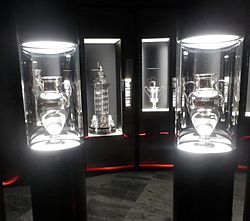
Benfica has won a record 38 Primeira Liga titles, a record 26 Taça de Portugal cups, and a record 8 Taça da Liga cups. They have also won 9 Supertaça Cândido de Oliveira and 3 Campeonato de Portugal. In total, they have 84 domestic trophies.
Internationally, Benfica has won 2 European Cups in a row and 1 Latin Cup, making a total of 87 trophies. This makes Benfica the most successful club in Portuguese football in terms of overall trophies.
In 2014, Benfica achieved the first-ever "treble" in Portugal, winning the Primeira Liga, Taça de Portugal, and Taça da Liga all in one season. Benfica is also the only club in Portugal to have successfully defended every major domestic title. They are also the only Portuguese team to have won the European Cup two times in a row.
Domestic Trophies
- Primeira Liga
- Winners (38) – record: 1935–36, 1936–37, 1937–38, 1941–42, 1942–43, 1944–45, 1949–50, 1954–55, 1956–57, 1959–60, 1960–61, 1962–63, 1963–64, 1964–65, 1966–67, 1967–68, 1968–69, 1970–71, 1971–72, 1972–73, 1974–75, 1975–76, 1976–77, 1980–81, 1982–83, 1983–84, 1986–87, 1988–89, 1990–91, 1993–94, 2004–05, 2009–10, 2013–14, 2014–15, 2015–16, 2016–17, 2018–19, 2022–23
- Taça de Portugal
- Winners (26) – record: 1939–40, 1942–43, 1943–44, 1948–49, 1950–51, 1951–52, 1952–53, 1954–55, 1956–57, 1958–59, 1961–62, 1963–64, 1968–69, 1969–70, 1971–72, 1979–80, 1980–81, 1982–83, 1984–85, 1985–86, 1986–87, 1992–93, 1995–96, 2003–04, 2013–14, 2016–17
- Taça da Liga
- Winners (8) – record: 2008–09, 2009–10, 2010–11, 2011–12, 2013–14, 2014–15, 2015–16, 2024–25
- Supertaça Cândido de Oliveira
- Winners (9): 1980, 1985, 1989, 2005, 2014, 2016, 2017, 2019, 2023
- Campeonato de Portugal
- Winners (3): 1929–30, 1930–31, 1934–35
European Trophies
- European Cup (UEFA Champions League)
- Winners (2): 1960–61, 1961–62
Other Trophies
- Latin Cup
- Winners (1): 1950
Winning Combinations (Doubles and Trebles)
- Primeira Liga and Taça de Portugal
- 11 – record: 1942–43, 1954–55, 1956–57, 1963–64, 1968–69, 1971–72, 1980–81, 1982–83, 1986–87, 2013–14, 2016–17
- Primeira Liga and Taça da Liga
- 4 – record: 2009–10, 2013–14, 2014–15, 2015–16
- Taça de Portugal and Taça da Liga
- 1 – shared record: 2013–14
- European double
- 1 – shared domestic record: 1960–61
- European cup double
- 1 – domestic record: 1961–62
Trebles
- 1 – record: 2013–14
Portuguese National Honours
- Commander of the Military Order of Christ (1932)
- Officer of the Order of Merit (1936)
- Medal of the Order of Prince Henry (1979)
See also
 In Spanish: Sport Lisboa e Benfica para niños
In Spanish: Sport Lisboa e Benfica para niños
- List of football club mergers
- List of UEFA club competition winners
- European Club Association
- S.L. Benfica (women)
 | Kyle Baker |
 | Joseph Yoakum |
 | Laura Wheeler Waring |
 | Henry Ossawa Tanner |


